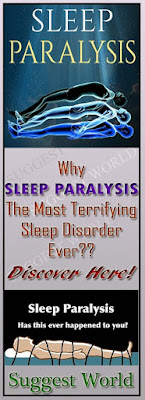It can happen to anyone. Trust us, compared to sleep paralysis, you’d welcome nightmares.
When James Allen Cheyne was a teenager, he woke up completely unable to move or speak, but he was aware that someone—or something—was in the room with him, walking around the bed.
 |
| Credit:suggest.world |
His assumption was that he’d either entered a portal to another world or that it was a demon. All he knew for sure was that it was absolutely, bone-chillingly terrifying. “When it happens, you have no idea if you’ll be able to move again,” he says. “And there’s this entity you feel, in the dark, sometimes even sitting on your chest. I can’t even describe the depth of fear that evokes.”
The episode, and several more, led Cheyne to become a sleep researcher, specializing in this particular disorder, known as sleep paralysis. It’s estimated that up to 7.6 percent of the population experiences moments like these at some point in their lives, and it makes even the most hardcore skeptics and atheists wonder if supernatural forces are at play.
“There’s a physiological cause, but when you’re in the midst of it, all kinds of scary thoughts go through your mind,” says Cheyne. “Only your brain is working right then, and it fills with the most outlandish explanations you can imagine.”
Here’s what you need to know about the spookiest sleep disorder ever:
THE MOST COMMON CAUSE IS SLEEP DISTURBANCE, AND THOSE WITH STRESS OR ANXIETY ARE MORE LIKELY TO EXPERIENCE EPISODES.
Your body goes through several stages of sleep on its way to having those dreams about chocolate rivers and sparkly unicorns (wait, is that only us?).
At one point, your body prepares for a REM cycle—the stage in which most dreams occur—by turning off your muscles as a way to protect you from harm. If you somehow wake up before REM is finished, you might be mentally aware, but your muscles haven’t been turned back on.
Stuck in that limbo between waking and sleeping, sufferers of sleep paralysis are completely frozen and unable to utter a word. Often, they also have auditory or physical hallucinations, like the feeling that something is pressing against them, or walking nearby.
People with other sleep issues tend to get hit the hardest by multiple paralysis episodes, Cheyne says. That might include a changed sleep schedule, high degrees of stress, insomnia, anxiety, or sleep apnea.
EPISODES USUALLY BEGIN IN ADOLESCENCE, BUT CAN CONTINUE FOR A LIFETIME.
The condition is an equal-opportunity terror. It can strike men or women, of any age, anywhere in the world. Like Cheyne, many people start having sleep paralysis experiences as teens, and that’s because adolescents have, essentially, the worst sleep habits of anyone. They need the most sleep and get the least. That sets them up for a level of sleep deprivation that messes with their circadian rhythms. Cue the paralysis.
But it can also come on at any point that sleep problems become an issue. Even the power of suggestion can be a factor—Cheyne notes that two of his graduate student researchers began having episodes while studying the condition. Talk about a lousy way to earn a high grade.
DURING AN EPISODE, YOU CAN THINK YOUR WAY OUT OF IT.
Although you might feel utterly helpless, it’s possible to use that working brain as an escape route, says Ethan Green, a Londoner who’s had numerous sleep paralysis episodes. The experiences led him to start No Sleepless Nights, a kind of online self-help community for better sleep habits.
Polling his readers, Green discovered that there are many tactics that people use in the midst of a sleep paralysis episode. Some begin counting to distract the mind, for example, while can others talk themselves into seeing it as a pleasant chance to have an out-of-body experience.
Green’s strategy: Tell yourself to wiggle one finger. Even the slightest conscious movement will knock your whole body back into awareness. But the technique might also work simply because it gives you a task, and that keeps you from going into full freak-out mode. “It doesn’t really matter what you think, say, or do,” he says. “It’s the act of staying calm and focusing your mind on something specific that probably helps. It occupies your brain and keeps you from creating hallucinations.”
Correcting your sleep problems through stress reduction and better sleep hygiene can go a long way toward prevention. But if paralysis does occur, it’s important to remind yourself that the condition is temporary. And, unless you happen to be a demon slayer, otherworldly creatures shuttled through a spectral portal aren’t the likely cause. Once you know that, you ain’t afraid of no ghost.
0 comments so far,add yours